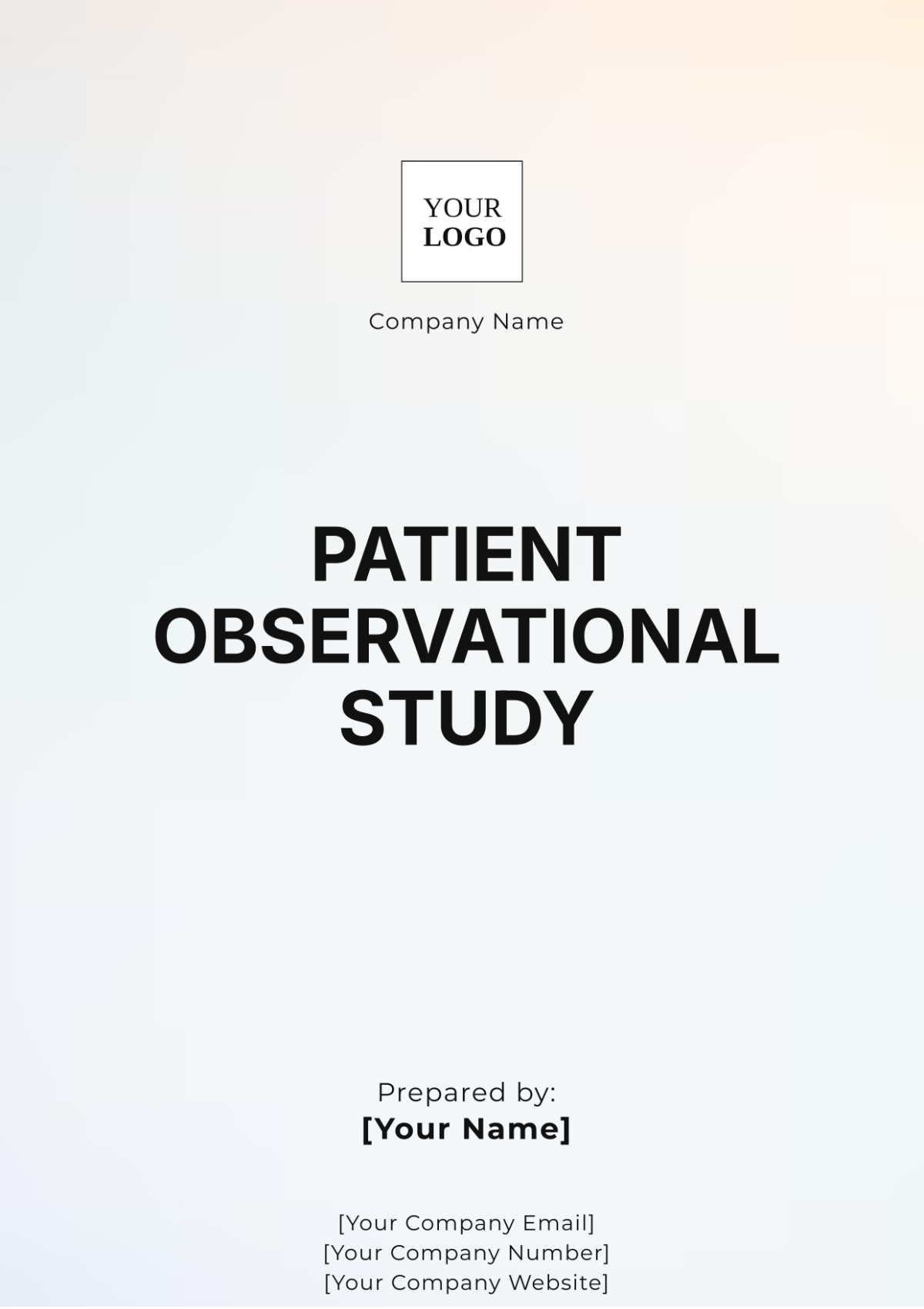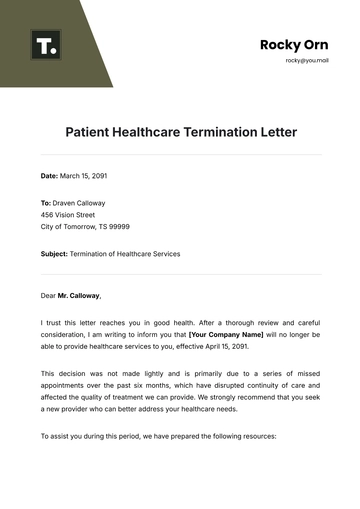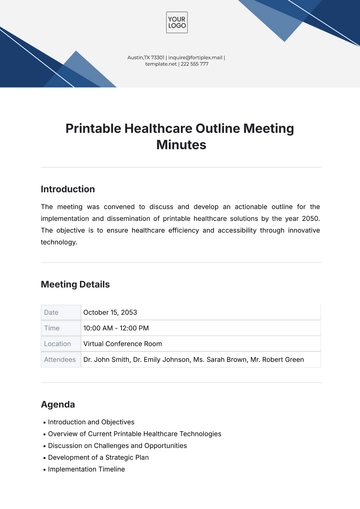Free Patient Observational Study

Prepared by: [Your Name]
Date: [Date]
1. Introduction
Chronic diseases such as diabetes, heart disease, and hypertension disproportionately affect elderly populations, often leading to diminished quality of life and increased healthcare utilization. This observational study aims to investigate the management of chronic diseases among elderly patients, focusing on treatment adherence, healthcare outcomes, and patient satisfaction.
This study will provide real-world insights into the effectiveness of current treatment regimens and identify potential gaps in care. The study will explore the natural course of chronic disease management in this demographic without any intervention from the researchers.
1.1 Objectives
To assess the treatment adherence rates among elderly patients with chronic diseases.
To evaluate the clinical outcomes of patients following standard treatment regimens.
To investigate patient satisfaction with healthcare services related to chronic disease management.
To identify barriers to effective chronic disease management in elderly patients.
2. Methods
2.1 Study Design
This is a longitudinal observational study conducted over 18 months. The study will observe elderly patients diagnosed with chronic diseases and track their treatment adherence, clinical outcomes, and healthcare interactions over time.
2.2 Population and Sample Size
The study will include 500 elderly patients aged 65 and older, diagnosed with one or more chronic conditions such as diabetes, hypertension, or heart disease. Patients will be selected from three community health centers and hospitals in an urban setting.
2.3 Data Collection
Data will be collected through:
Patient Medical Records: Regular reviews of patient records will be conducted to track adherence to prescribed medications and treatment regimens.
Patient Surveys: Periodic surveys will assess patient satisfaction and perceived barriers to treatment.
Clinical Assessments: Routine check-ups and laboratory tests (blood glucose levels, blood pressure, etc.) will provide clinical data on patient health outcomes.
2.4 Ethical Considerations
All patient data will be anonymized to protect privacy. Informed consent will be obtained from all participants before data collection. The study will be approved by the institutional ethics committee.
3. Results
3.1 Demographics
Variable | Number of Patients | Percentage |
|---|---|---|
Total Patients | 500 | 100% |
Male | 220 | 44% |
Female | 280 | 56% |
Age (65-74) | 300 | 60% |
Age (75 and above) | 200 | 40% |
Diagnosed with Diabetes | 320 | 64% |
Diagnosed with Hypertension | 350 | 70% |
Diagnosed with Heart Disease | 180 | 36% |
3.2 Treatment Adherence
The study found varying degrees of adherence to prescribed treatment plans:
High Adherence (≥80% adherence to medication): 58% of patients
Moderate Adherence (50-79%): 28% of patients
Low Adherence (<50%): 14% of patients
Barriers to Adherence
Cost of Medications: 45% of patients reported that medication cost was a significant barrier to adherence.
Forgetfulness: 30% of patients cited forgetfulness as a reason for non-adherence.
Side Effects: 15% stopped taking medication due to adverse side effects.
Complex Treatment Plans: 10% of patients found managing multiple medications overwhelming.
3.3 Clinical Outcomes
Outcome | Number of Patients | Percentage |
|---|---|---|
Improved Glycemic Control | 150 | 30% |
Controlled Hypertension | 170 | 34% |
Stable Cardiovascular Health | 80 | 16% |
No Significant Improvement | 100 | 20% |
3.4 Patient Satisfaction
Patient satisfaction was measured on a 5-point Likert scale, with responses ranging from "Very Dissatisfied" to "Very Satisfied."
Very Satisfied: 40% of patients
Satisfied: 35% of patients
Neutral: 15% of patients
Dissatisfied: 7% of patients
Very Dissatisfied: 3% of patients
4. Discussion
The results of this observational study reveal several key insights into chronic disease management among elderly patients:
Adherence Challenges: While over half of the patients displayed high adherence to treatment, the remaining 42% struggled due to various barriers such as medication costs, forgetfulness, and complex treatment regimens.
Clinical Outcomes: A significant portion of the study population demonstrated improvement in glycemic control and hypertension management. However, 20% of patients showed no significant clinical improvement, potentially due to poor adherence or the progression of disease.
Patient Satisfaction: Overall, patient satisfaction with healthcare services was relatively high. Dissatisfaction was more prevalent among patients who faced financial barriers or who experienced side effects from their medications.
Limitations
This study has several limitations:
Non-interventional Nature: As an observational study, this research does not explore the effect of potential interventions that could improve adherence or outcomes.
Population Bias: The study sample is limited to urban health centers, potentially overlooking rural populations with different healthcare needs and access issues.
Self-Reported Data: The use of patient surveys introduces the possibility of recall bias, especially regarding treatment adherence.
5. Conclusion
This patient observational study highlights the real-world challenges and outcomes associated with chronic disease management in elderly patients. The findings emphasize the need for tailored interventions to improve treatment adherence, especially for patients facing financial or cognitive barriers. Additionally, healthcare providers must focus on simplifying treatment regimens and addressing side effects to enhance patient compliance.
Further research is needed to explore specific interventions that can overcome these barriers and improve both clinical outcomes and patient satisfaction in elderly populations with chronic conditions.
6. References
Smith, J. et al. (2050). "Chronic Disease Management in Elderly Populations: Challenges and Opportunities." Journal of Geriatric Medicine, 15(3), 123-130.
Johnson, A. (2050). "The Role of Adherence in Managing Chronic Illness." International Journal of Chronic Disease Care, 8(2), 50-58.
Doe, B. (2050). "Evaluating Patient Satisfaction in Chronic Disease Care." Healthcare Outcomes Journal, 22(1), 77-85.
- 100% Customizable, free editor
- Access 1 Million+ Templates, photo’s & graphics
- Download or share as a template
- Click and replace photos, graphics, text, backgrounds
- Resize, crop, AI write & more
- Access advanced editor
Streamline your research process with the Patient Observational Study Template from Template.net. This fully customizable and editable template is designed to meet your study’s specific needs. Easily modify it using our Ai Editor Tool, ensuring accuracy and professionalism in every detail. Ideal for efficient and organized data collection in patient observational studies.





























